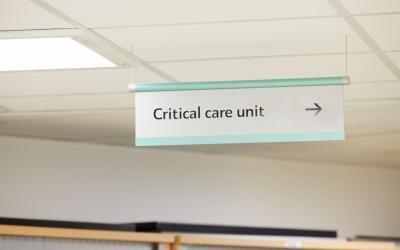Explainer: treatment of acute coronary syndrome

Acute coronary syndromes (ACS) are common: 1.5 million hospital discharges each year involve patients with ACS in the USA alone. What is it, how is it diagnosed and treated and what is the prognosis for patients? Sarah Harrop takes a closer look.
What is acute coronary syndrome?
Acute coronary syndrome (ACS) is an umbrella term for a group of cardiovascular diseases related to sudden, reduced blood flow to the heart, such as heart attack (acute myocardial infarction) and unstable angina. The restricted blood flow is usually because a thrombus (blood clot) has formed on an atheromatous plaque (a build-up of fatty material including cholesterol) in a coronary artery: a condition known as atherosclerosis.
Acute coronary syndrome includes ST-segment-elevation (STEMI) myocardial infarction - ‘ST element’ referring to a specific part of the electrocardiogram (ECG) readout of a heart beat - where there is total blockage of the coronary artery and a long interruption to the blood supply. This can cause damage to a large area of the heart.
ACS also includes less serious NSTEMI (non-ST-segment-elevation, also known as non-ST-elevation myocardial infarction or NSTE-ACS), in which the supply of blood to the heart may be only partially blocked with less damage to heart tissue.
Unstable angina is an acute coronary syndrome without any biochemical evidence of damage to the heart tissue. It could include more than 20 minutes of angina when the person is resting, sudden onset of severe angina, angina that is getting more frequent or lasting for longer periods of time or which has happened after a recent heart attack.
According to statistics from the American Heart Association (AHA), approximately 18% of men and 23% of women over the age of 40 will die within one year of having a heart attack. What is more, ACS carries a huge economic burden, costing Americans alone more than $150 billion each year.
What are the symptoms of acute coronary syndrome?
ACS is a medical emergency which needs urgent diagnosis and treatment, often simultaneously. Symptoms appear suddenly and can include:
- chest pain or discomfort that feels like aching, pressure, tightness or burning
- pain that starts in the chest and spreads to shoulders, arms, upper belly area, back, neck or jaw
- sudden, heavy sweating
- increased heart rate
- feeling sick or vomiting
- indigestion
- being short of breath
- feeling lightheaded or dizzy
- fainting
- unusual fatigue
How is acute coronary syndrome diagnosed?
A patient coming into hospital with ACS symptoms needs to be quickly diagnosed, with the clinical team taking medical history, carrying out a physical examination, doing a blood test and carrying out an echocardiogram (ECG).
The blood test will check for certain enzymes, hormones, and other proteins that slowly leak into the blood after heart damage from acute myocardial infarction. The most sensitive of these so-called cardiac biomarkers is cardiac troponin, which stays in patients’ blood the longest after other biomarkers have returned to normal levels. Other less sensitive biomarkers for acute myocardial infarction include creatine kinase, creatine kinase MB and myoglobin.
An ECG can diagnose an acute coronary syndrome by measuring the heart’s electrical activity.
If the test shows that the heart has restricted or blocked blood flow, the cardiology team will work fast to restore it before further damage is done to the heart muscle.
Healthcare professionals may also carry out other tests to learn more about the patient’s condition and rule out other causes of the symptoms. These include:
Coronary angiography – a catheterization-based technique that helps doctors to see blockages in arteries. A long, thin flexible tube called a catheter is inserted in a blood vessel, usually in the groin or wrist and is guided through the vascular system to the heart. Dye flows through the catheter and its movement through the arteries of the heart is imaged by a series of X-rays.
Echocardiogram - This test uses sound waves to create pictures of the beating heart. It shows how blood flows through the heart and heart valves. An echocardiogram can help determine whether the heart is pumping correctly.
Myocardial perfusion imaging - which shows how well blood flows through the heart muscle using a tiny amount of radioactive substance put into a vein. A specialised camera images the substance as it travels through the heart, which helps to find areas of poor blood flow or damage.
Computed tomography (CT) angiogram – uses powerful X-rays to create images of the heart and its blood vessels.
The thrombolysis in myocardial infarction (TIMI) risk score- a tool used to predict the chances of having or dying from a heart event for people with ACS. Doctors can use the TIMI risk score to help manage the condition and make decisions about patients’ treatment.
What is the significance of elevated cardiac enzyme levels in treatment for acute coronary syndrome?
Cardiac enzyme biomarkers are recommended to be measured in all patients who come to hospital with symptoms of ACS. Elevations of cardiac enzyme levels should be interpreted alongside clinical findings and ECG results. So what does it mean if a person’s blood levels of cardiac enzymes are higher than normal?
Cardiac troponins T and I are the most specific and sensitive biomarkers for diagnosing heart attack. Troponin is a protein released from cardiac muscle cells (myocytes) when irreversible damage has occurred to the myocardium (the muscular, middle layer of the heart). It is highly specific to cardiac tissue and accurately diagnoses myocardial infarction with a history of ischemic pain or ECG changes that suggest myocardial ischemia. Cardiac troponin level also depends on the size of the infarct (area of damaged heart tissue), therefore it can give an indicator for the patient’s prognosis. The risk of death from an ACS is directly related to troponin level and patients with no detectable troponins have a good short-term prognosis.
New high-sensitivity assays (tests) for cardiac troponins have been developed that can measure troponin values at much lower levels. With the use of these high-sensitivity assays, more patients with unstable angina will be classified as having NSTIM, helping to define those patients at higher risk and leading to the right treatment and better outcomes for them.
Raised troponin levels can also occur in patients without an ACS and patients with this test result do less well in other clinical situations, such as in congestive heart failure, sepsis, acute pulmonary embolism and chronic kidney disease. Elevated troponin levels are also seen in patients with myocarditis and aortic dissection - a serious condition in which a tear occurs in the inner layer of the body's main artery (aorta).
Raised levels of other heart enzymes such as myocardial muscle creatine kinase (CK-MB), myoglobin and natriuretic peptides such as B-type natriuretic peptide (BNP) are also useful diagnostic biomarkers, although less sensitive than troponins.
How is ACS treated?
Cardiology treatment for ACS aims to achieve revascularization – restoration of blood flow – as fast as possible. It is treated with medicines to dissolve the blood clot (fibrinolytic drugs) and a procedure called angioplasty, also known as percutaneous coronary intervention (PCI) or coronary artery bypass grafting (CABG). Alongside this is often drug treatment to treat ACS and the underlying coronary artery disease.
Percutaneous coronary intervention (PCI): consists of a small balloon being inflated inside the artery to open it wider and restore circulation, usually followed by the cardiology team placing a tube of wire mesh called a stent inside the artery to keep it open permanently. If a hospital isn’t equipped to do this fast enough, another option is to give the patients intravenous drugs to thin their blood (anticoagulation) and thrombolytics to dissolve blood clots (thrombolysis).
According to the NHS NICE guidelines, people with the most serious form of ACS, acute ST-segment elevation myocardial infarction (STEMI) should be immediately assessed for eligibility for coronary reperfusion therapy either percutaneous coronary intervention (PCI) or fibrinolysis.
Fibrinolytic therapy: the drugs used for ACS depend on the type of coronary heart disease that is involved. Some commonly used drugs for the treatment of ACS include:
- low-dose aspirin
- clopidogrel
- rivaroxaban
- ticagrelor
- Prasugrel
- Beta-blockers
- Glycoprotein IIb/IIIa inhibitors – can be considered for certain patients undergoing PCI and who have high-risk lesions such as thrombosis (blood clots) and no re-flow of blood
- A heparin (unfractionated or low molecular weight heparin) or bivalirudin (particularly in STEMI patients at high risk of bleeding)
- IV nitroglycerin
- Angiotensin-converting enzyme (ACE) inhibitor (as early as possible)
- Statins
Can acute coronary syndrome be cured?
Management of acute coronary syndrome is possible and patients can lead a normal life after having heart surgery or problems like a heart attack. People who have had heart surgery on the NHS will be cared for by a cardiac rehabilitation service in the weeks after their surgery. Patients take part in cardiac rehabilitation programmes covering exercise, education, relaxation and emotional support. They are also encouraged to exercise regularly and lead a healthy lifestyle to protect their hearts and reduce the risk factors for future heart-related problems.
What are the risk factors for acute coronary syndrome?
According to the American Heart Association (AHA), ACS, just like heart failure and stroke, are much more likely in people who have certain risk factors that are predictors of the disease. These include:
- smoking
- high blood pressure (hypertension)
- high blood cholesterol
- diabetes
- physical inactivity
- being overweight or obese
- a family history of chest pain, heart disease or stroke.
Take your nursing skills to the next level
From cardiovascular diseases to infection, relational ethics to understanding the research process, registered nurses who study on the MSc Nursing at Queen Margaret University will build on and enhance their existing knowledge, experience and skills and demonstrate understanding as socially conscious, critically creative, reflexive, evidence-based practitioners.
The QMU MSc Nursing programme is for registered nurses to critically develop their own professional practice and related career development, and to prepare them to pursue future doctoral study in a wide range of international settings.
What is more, as the master’s is delivered entirely online you can study from anywhere in the world, and fit your degree around your busy work schedule and family commitments. Find out more

















The information below is required for social login
Login to your Account